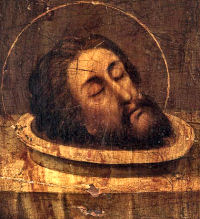Proper 10 - Year B
The Seventh Sunday after Pentecost
Mark 6:14-29
"When [Herod] heard [John the Baptist], he was greatly perplexed; and yet he liked to listen to him"
"I didn't join this church to be criticized."
"I didn't get married in order to become the object of criticism."
"I never anticipated that having children would result in the withering criticism of me which they sometimes dish out."
"When I agreed to manage this part of the company the last thing I expected was a delegation of employees with a document critical of my management style."
Critics. We've all got 'em. The more we do and the greater the risks we take the higher our degree of vulnerability to such criticism. If we play safe, though, we are criticized for that too.
Critics - blast them! Why don't they leave me alone?
 Herod Antipas (a Roman client-governor based on the Western shore of the Sea of Galilee) was a curious fellow with an odd love-hate relationship to his greatest critic - John the Baptist. The Baptist had zeroed in on improprieties in Herod's family life - most especially his marriage to Herodias, the former wife of his brother Philip Antipater. Whenever John preached, though, Herod would always listen. He was both "perplexed" (set back, troubled or confounded) by the Baptist's critical preaching and yet, at the same time, strangely compelled to pay attention. Aren't we most angered by those words of criticism which resound somewhere within us? We worry that they might be true. We find that they mirror what others have said about us before. Those ultimately caught in a significant fault by their critics will say it was something they knew themselves all along. It didn't come as a surprise.
Herod Antipas (a Roman client-governor based on the Western shore of the Sea of Galilee) was a curious fellow with an odd love-hate relationship to his greatest critic - John the Baptist. The Baptist had zeroed in on improprieties in Herod's family life - most especially his marriage to Herodias, the former wife of his brother Philip Antipater. Whenever John preached, though, Herod would always listen. He was both "perplexed" (set back, troubled or confounded) by the Baptist's critical preaching and yet, at the same time, strangely compelled to pay attention. Aren't we most angered by those words of criticism which resound somewhere within us? We worry that they might be true. We find that they mirror what others have said about us before. Those ultimately caught in a significant fault by their critics will say it was something they knew themselves all along. It didn't come as a surprise.
You'll hear the whole story this Sunday: Herod is tricked by Herodias and her daughter into beheading the Baptist as part of a rash and injudicious wager which the ruler has made. Herod does what he knows he ought not to have done.
What would happen to you if you got your wish? What if your critic could be silenced? It could be the voice of some other person - an enemy or a meddling friend. It might be something within your own self - the voice of your own troubled conscience. It might be some word of Scripture which cut straight to the bone of what ails you.
It's not impossible to turn such a voice off - it can always be done.
You will distance yourself from a meddling friend. You can destroy your enemy. You might school yourselves that the voice within you is just some neurotic nagging force which is best not-listened-to. You could avoid those Scriptures which trouble you. It happens all the time.
It's not impossible to turn such a voice off - it can always be done.
You will distance yourself from a meddling friend. You can destroy your enemy. You might school yourselves that the voice within you is just some neurotic nagging force which is best not-listened-to. You could avoid those Scriptures which trouble you. It happens all the time.
Would you be better off, though? The face of Herod Antipas, when he is presented with the head of John the Baptist on a platter, is often depicted by artists as being the face of a man facing the horrifying truth that he is now suddenly and entirely alone.
There can be no road now out of the hole he's dug for himself - no one left to shake the branch he's sitting on.
There can be no road now out of the hole he's dug for himself - no one left to shake the branch he's sitting on.







